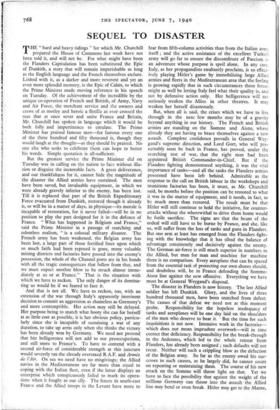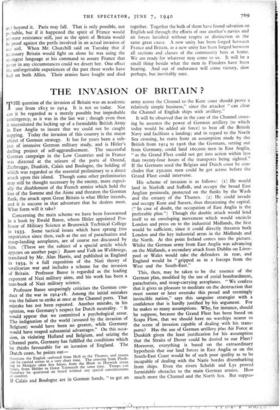SEQUEL TO DISASTER
THE " hard and heavy tidings " for which Mr. Churchill prepared the House of Commons last week have not been told it, and will not be. For what might have been the Flanders Capitulation has been substituted the Epic of Dunkirk, a story that will remain imperishable as long as the English language and the French themselves endure. Linked with it, as a darker and more reverent and yet an even more splendid memory, is the Epic of Calais, to which the Prime Minister made moving reference in his speech on Tuesday. Of the achievement of the incredible by the unique co-operation of French and British, of Army, Navy and Air Force, the merchant service and the owners and crews of as motley and heroic a flotilla as ever crossed the seas that at once sever and unite France and Britain, Mr. Churchill has spoken in language which it would be both folly and impertinence to emulate. The Prime Minister has praised famous men—for famous every one of the three hundred and fifty thousand is, though they would laugh at the thought—as they should be praised. No one else who seeks to celebrate them can hope to better his words. Simple quotation is all-sufficient.
But the greatest service the Prime Minister did on Tuesday was in calling on the nation to face without illu- sion or disguise the inexorable facts. A great deliverance, and our thankfulness for it, cannot hide the magnitude of the disaster the Allied armies have sustained. The men have been saved, but invaluable equipment, in which we were already gravely inferior to the enemy, has been lost. Till it is replaced that part of the British Expeditionary Force evacuated from Dunkirk, restored though it already is, or will be in a matter of days, in physique—its morale is incapable of restoration, for it never failed—will be in no position to play the part designed for it in the defence of France. " What has happened in Belgium and France," said the Prime Minister in a passage of searching and relentless realism, " is a colossal military disaster. The French army has been weakened, the Belgian army has been lost, a large part of those fortified lines upon which so much faith had been reposed is gone, many valuable mining districts and factories have passed into the enemy's possession, the whole of the Channel ports are in his hands with all the tragic consequences that follow from that, and we must expect another blow to be struck almost imme- diately at us or at France." That is the situation with which we have to reckon. The only danger of its domina- ting us would be if we feared to face it.
And that is not all. We have to reckon, too, with an extension of the war through Italy's apparently imminent decision to commit an aggression as shameless as Germany's and more contemptible. Her action may still be delayed. Her purpose being to snatch what booty she can for herself at as little cost as possible, it is her obvious policy, particu- larly since she is incapable of sustaining a war of any duration, to take up arms only when she thinks the victory has been already won by Germany. We need not pretend that her belligerence will not add to our preoccupations, and still more to France's. To have to contend with a second air-force of considerable strength at this juncture would severely tax the already overtaxed R.A.F. and Armee de l'Air. On sea we need have no misgivings; the Allied navies in the Mediterranean are far more than equal to coping with the Italian fleet, even if the latter displays an enterprise which conspicuously failed to mark its opera- tions when it fought as our ally. The forces in south-east France and the Allied troops in the Levant have more to fear from fifth-column activities than from the Italian arm', itself ; and the active assistance of the excellent Turkish; army will go far to ensure the discomfiture of Fascism 17 an adventure whose purpose is spoil alone. In any cast Italy, as her propagandists exultantly proclaim, is so effect- ively playing Hitler's game by immobilising large Allied armies and fleets in the Mediterranean area that the feeling is growing rapidly that in such circumstances those forces might as well be letting Italy feel what their quality is, and not by defensive action only. Her belligerence will no seriously weaken the Allies in other theatres. It may weaken her herself disastrously.
But, when all is said, the crises which we have to live through in the next few months may be of a gravity beyond anything in our history. The French and British armies are standing on the Somme and Aisne, where already they are having to brace themselves against a new assault. Complete confidence prevails in General Wey- gand's supreme direction, and Lord Gort, who will pre- sumably soon be back in France, has proved, under the searching test of war, that the right man had been appointed British Commander-in-Chief. But if the Flanders fighting demonstrated anything, it was the vital importance of tanks—and all the tanks the Flanders armies possessed have been left behind. Admirable as the response to the call on British labour in the workshops and munitions factories has been, it must, as Mr. Churchill said, be months before the position can be restored to what it was in the matter of equipment, and it needs, in fact, to be much more than restored. The result must be that Hitler will still continue to hold the initiative, for counter- attacks without the wherewithal to drive them home would be futile sacrifice. The signs are that the brunt of the ordeal will still have to be borne by France, and she, like us, will suffer from the loss of tanks and guns in Flanders. But one arm at least has emerged from the Flanders fight- ing with the knowledge that it has tilted the balance of advantage consistently and decisively against the enemy. The German air-force is still much superior in numbers to the Allied, but man for man and machine for machine there is no comparison. Every aeroplane that can be spared from the essential task of protecting our own shores should, and doubtless will, be in France defending the Somme- Aisne line against the new offensive. Everything we have must be at General Weygand's disposal.
The disaster in Flanders is now history. The last Allied soldier has left Dunkirk. Glory, and the lives of three hundred thousand men, have been snatched from defeat. The causes of that defeat we need not at this moment probe. Responsibility for the hopeless inadequacy of tanks and aeroplanes will be one day laid on the shoulders of the men who deserve to bear it. But the time for such inquisitions is not now. Intensive work in the factories— which does not mean imprudent overwork—will in time correct that deficiency. Responsibility for the break-through in the Ardennes, which led to the whole retreat from Flanders, has already been assigned ; such defaults will not recur. Neither will such a crippling blow as the defection of the Belgian army. So far as the enemy owed his suc- cesses to such causes, as he largely did, he cannot count on repeating or maintaining them. The course of his new attack on the Somme will throw light on that. Yet we have to face the possibility that against the weight of the millions Germany can throw into the assault the Allied line may bend or even break. Hitler may get to the Marne, and beyond it. Paris may fall. That is only possible, not prcbable, but if it happened the spirit of France would animate resistance still, just as the spirit of Britain would be proof against the perils involved in an actual invasion of our soil. When Mr. Churchill said on Tuesday that if necessary Britain would fight on alone he was using the strangest language at his command to assure France that never in any circumstances could we desert her. One effect the unforgettable experiences of the past three weeks have had on both Allies. Their armies have fought and died together. Together the bulk of them have found salvation on English soil through the efforts of one another's navies and air forces lavished without respite or distinction in the same great cause. A new unity has been forged between France and Britain, as a new unity has been forged between all sections and classes of the community here at home. We are ready for whatever may come to us. It will be a small thing beside what the men in Flanders have been bearing. And out of endurance will come victory, slow perhaps, but inevitably sure.



































 Previous page
Previous page